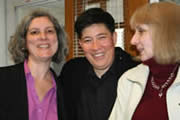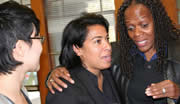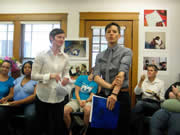The first course in Women's Studies was offered at the University of Illinois at Urbana-Champaign in 1970. For the next seven years, committed faculty began to develop courses and advocate for a Women’s Studies Program. Paula Treichler (Professor of Communication), Cheris Kramarae (Professor of Speech Communication) and Beth Stafford (Women's Studies Librarian) were among those who helped pioneer feminist studies at the local and national levels.
 In the fall of 1978, an Office of Women's Studies was founded and housed in the School of Humanities, and Joan Huber (Professor of Sociology) appointed director. At that time there were no faculty, but the Program initiated a newsletter, the Feminist Scholarship Series (a brown bag lecture series), and a number of groundbreaking national conferences, featuring then-new scholars who would go on to contribute significantly to the field, including Chandra Talpade Mohanty, Lourdes Torres, and Ann Russo.
In the fall of 1978, an Office of Women's Studies was founded and housed in the School of Humanities, and Joan Huber (Professor of Sociology) appointed director. At that time there were no faculty, but the Program initiated a newsletter, the Feminist Scholarship Series (a brown bag lecture series), and a number of groundbreaking national conferences, featuring then-new scholars who would go on to contribute significantly to the field, including Chandra Talpade Mohanty, Lourdes Torres, and Ann Russo.
 Under the leadership of Marianne Ferber (Professor of Economics), who became the director in 1980, the Office of Women's Studies was moved to the College of Liberal Arts and Sciences, and the program began to develop its own curriculum. The third director, Berenice A. Carroll (Associate Professor of Political Science) oversaw the creation of an official Women's Studies Program and the approval of a Women's Studies Minor.
Under the leadership of Marianne Ferber (Professor of Economics), who became the director in 1980, the Office of Women's Studies was moved to the College of Liberal Arts and Sciences, and the program began to develop its own curriculum. The third director, Berenice A. Carroll (Associate Professor of Political Science) oversaw the creation of an official Women's Studies Program and the approval of a Women's Studies Minor.
The number of faculty and courses steadily increased over the years, and the Program instituted a graduate minor in 1993. In 2003, under the direction of Kal Alston (Associate Professor of EPS), the Program changed its name to Gender and Women's Studies. In 2004, after years of offering an Independent Plan of Study (IPS) degree, the program established the GWS undergraduate major. In 2010, the program became a department, and established the Queer Studies minors for both undergraduate and graduate study.
 The Department of Gender and Women’s Studies at the University of Illinois is now a benchmark for innovative and boldly imagined feminist and queer studies scholarship across the country. Our faculty research and teaching covers a wide range of interconnected areas that are at the forefront of intellectual developments in the field, with particular strengths in queer and transgender studies and theory, with a strong emphasis on queer of color critique; women of color feminisms; transnational and postcolonial feminisms, with emphases on race and religion; and new media, visual studies, and performance studies; indigenous feminisms; and critical disability studies.
The Department of Gender and Women’s Studies at the University of Illinois is now a benchmark for innovative and boldly imagined feminist and queer studies scholarship across the country. Our faculty research and teaching covers a wide range of interconnected areas that are at the forefront of intellectual developments in the field, with particular strengths in queer and transgender studies and theory, with a strong emphasis on queer of color critique; women of color feminisms; transnational and postcolonial feminisms, with emphases on race and religion; and new media, visual studies, and performance studies; indigenous feminisms; and critical disability studies.